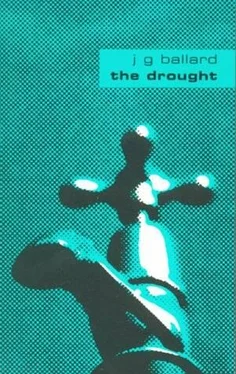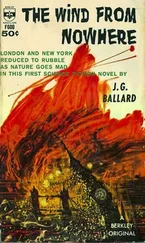On the seaward side of the ships, a second team of men was working in one of the tanks, bending in the cold water as they harvested the edible kelp. Swathed in rubber tubing, they looked like primitive divers experimenting with makeshift suits in the shallow water.
Directly below the gangway of the freighter half a dozen round basins had been cut in the salt dunes, temporary storage tanks for people moving with their water up and down the coast. Ransom steered his pool into the second of them, next to a visiting fisherman selling his wares to one of the foremen. The two men argued together, stepping down into the water and feeling the plump plaice and soles.
Ransom drove his paddle into the sand by his pool. Half the water had been lost on the way, and there was barely enough to cover the floor of the basin.
He called up to the look-out on the bridge: "Is Captain Hendry aboard? Ransom to see him."
The man came down the companionway to the deck, and beckoned Ransom after him. They walked past the boarded-up portholes. Unpainted for ten years, the hulk was held together by little more than the tatters of rust. The scars of shellfire marked the decks and stanchions-the freighter, loaded with fresh water and supplies, had been stormed by the insurgents breaking out from the rear areas of the beach, and then shelled from the destroyer now reclining among the dunes a hundred yards away. Through one of these tears, gaping like an empty flower in the deck overhead, Ransom could see an old surplice drying in the sun.
"Wait here. I'll see the Captain."
Ransom leaned on the rail, looking down at the yard below. An old woman in a black shawl chopped firewood with an ax, another straightened the kelp drying on a frame in the sunlight. The atmosphere in the settlement was drab and joyless, like that of an early pilgrim community grimly held together on the edge of some northern continent. Partly this was due to the vague sense of remorse still felt by the survivors-the specters of the thousands who had been killed on the beaches, or driven out in herds to die in the sea, haunted the bitter salt. But it also reflected the gradual attrition of life, the slow reduction of variety and movement as the residues of their past lives, the only materials left to them, sank into the -sterile dunes. This sense of diminishing possibility, of the erosion of all time and space beyond the flaccid sand and the draining branches, numbed Ransom's mind.
"The Captain will see you."
Ransom followed the man into the ship. The nautical terminology-there were some dozen captains, including Hendry, Jordan, and the Reverend Johnstone, a kind of ex officio rear-admiral-was a hangover from the first years when the nucleus of the original settlement had lived in the ship. The freighter sat where she had been sunk in the shallow water, the waves breaking her up, until the slopes of salt produced by the distillation units had driven the water back into the sea. At this stage thousands of emigrants were living in the cars and shacks on the beaches, and the distillation units, run by the citizens' cooperatives that had taken over from the military after the break-out battles, were each producing tons of salt every day. The large freighter had soon been inundated.
"Well, Charles, what have you brought now?" Seated at his desk in the purser's cabin, Hendry looked up as Ransom came in. Waving Ransom into a chair, he peered down the columns of an old leatherbound logbook that he used as a combined ledger and diary. In the intervening years the quiet humor had gone, and only the residue of the conscientious policeman remained. Dour and efficient, but so dedicated to securing the minimum subsistence level for the settlement that he could no longer visualize anything above that meager line, he summed up for Ransom all the dangers and confinements of their limbo.
"Judith sends her love, Captain," Ransom began. "How's the baby coming along?"
Hendry gestured vaguely with his pen. "As well as can be expected."
"Would you like some water for it? I have some outside. I was going to hand it over to the settlement, but I'd be delighted to give you and Julia the first cut."
Hendry glanced sharply at Ransom. "What water is this, Charles? I didn't know you had so much now you were giving it away."
"It isn't mine to give. The poachers were out again last night, stealing Jordan 's catch as it came in. I found this pool near the channel this morning."
Hendry stood up. "Let's have a look at it." He led the way out onto the deck. "Where is it? _That_ one down there?" Shaking his head, he started back for his cabin. "Charles, what are you playing at?"
Ransom caught up with him. "Judith and I have been talking it over seriously, Captain… it's been seffish of us living alone, but now we're prepared to join the settlement. You'll soon' need all the help you can get to bring in the sea."
"Charles…" Hendry hesitated. "We're not short of water."
"Perhaps that's true, in the immediate sense, but a year or two from now-we've got to think ahead."
Hendry nodded to himself. "That's good advice." He turned in the door to his cabin. For a moment the old Hendry glimmered faintly in his eyes. "Thanks for the offer of the water, Charles. Look, you wouldn't like it in the settlement, the people have given too much. If you came here, they'd drain you away."
Reflectively he patted the white carcass of a small shark hanging in the sun outside the cabin, the shriveled face gaping sightiessly at Ransom.
Resting on the rail, Ransom pulled himself together. Hendry's refusal meant that he was acting on some decision already reached by the other captains.
The look-out stood by the gangway, watching Ransom's tall gaunt figure move restlessly along the rail. Ransom went over to him. "Where's Captain Jordan? Is he here?"
The man shook his head. "He's over in the cliffs. He won't be back till evening."
Ransom looked back at the distant hills, debating whether to wait for Jordan. Almost every afternoon he went out to the hills above the beach, disappearing among the sand-dunes that spilled through the ravines. Ransom guessed that he was visiting the grave of his foster-father, Mr. Jordan. The old Negro had died a few days after their arrival at the beach, and Philip had buried him somewhere among the dunes.
As he stepped past the look-out, the man said softly: "Miss Vanessa wants to see you."
Nodding to the man, Ransom glanced up and down the silent hulk of the ship, and then crossed to the port side. The look-out's feet rang softly on the metal rails of the bridge, but otherwise this side of the ship was silent.
Ransom walked along the empty deck. A rusty companionway led to the boatdeck above. Most of the lifeboats had been smashed to splinters in the bombardment, but the line of officers' cabins was still intact. In one of these small cubicles behind the bridge, Vanessa Johnstone lived by herself.
Ransom reached the companionway, then stopped to glance through a damaged ventilator. Below was the central chamber of the ship. This long, high-ceilinged room had been formed when the floor dividing the passenger lounge from the dining room below had rusted out. It was now the Reverend Johnstone's combined vestry and throne-chamber.
A few oil-lamps flared from brackets on the wall, and cast a flickering submarine glow on to the ceiling, the shadows of the torn deck braces dancing like ragged spears. The floor of the chamber was covered with mats of dried kelp to keep out the cold. In the center, almost below Ransom, the Reverend Johnstone sat in an armchair mounted in the bow section of an old lifeboat, the very craft from which Johnstone had led the first assault on the freighter. The conchlike bowl, with its striped white timbers, was fastened to the small dais that had once been the bandstand. On the floor beside him were his daughters, Julia and Frances, with two or three other women, murmuring into their shawls and playing with a baby swaddled in rags of lace.
Читать дальше
Конец ознакомительного отрывка
Купить книгу








